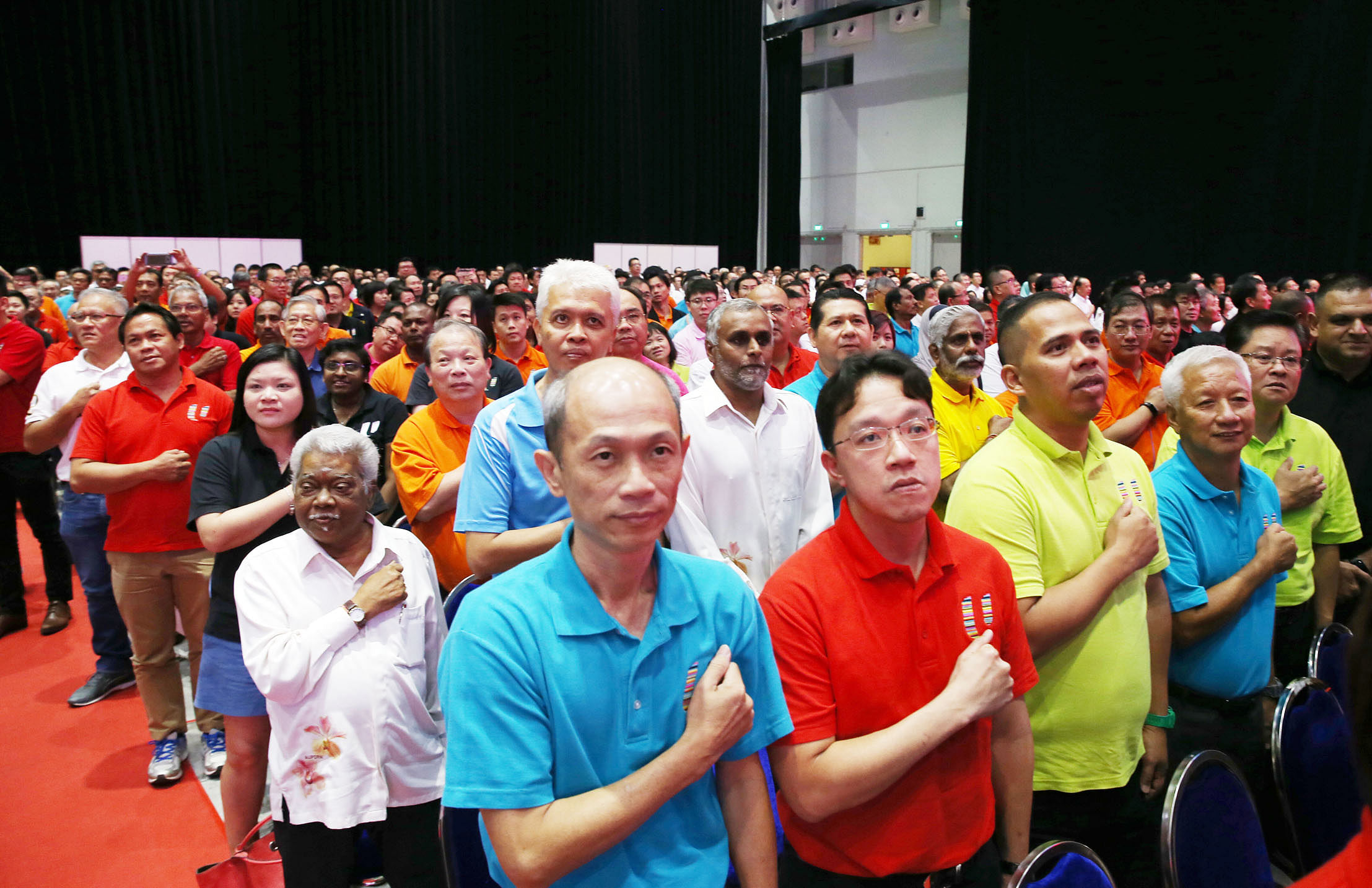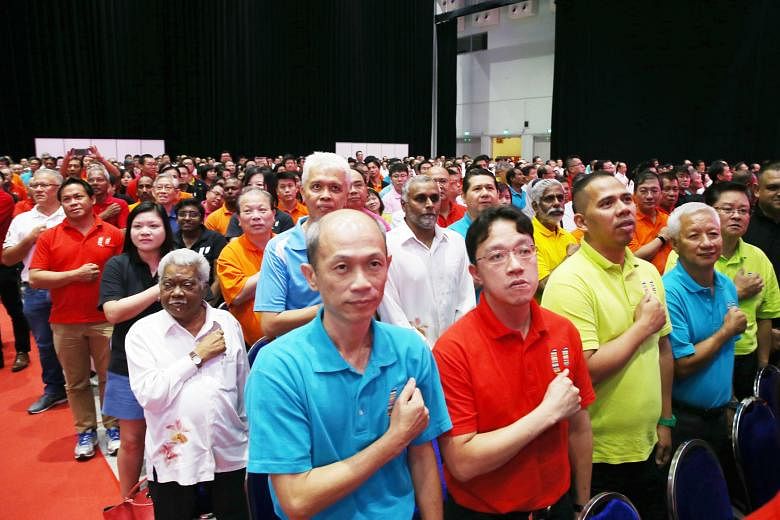The symbiotic relationship between the People's Action Party (PAP) and the unions is deepening.
The National Trades Union Congress (NTUC) on Tuesday said PAP ministers and office-holders will take on additional advisory roles within various NTUC arms, such as its unit for freelancers and self-employed people.
All PAP MPs, where possible, will also advise not just unions - as they already do now - but professional bodies under the NTUC as well.
The announcement came two days after PAP secretary-general Lee Hsien Loong reiterated the importance of his party's symbiotic relationship with NTUC at the PAP convention on Sunday.
He said: "Over the decades, the PAP and the labour movement stood together through many difficult times... Because we stayed together, the country thrived, and people's lives improved."
NTUC sent one of the largest delegations in history to the PAP's annual get-together this year. At 240-strong, it is 10 times the delegation size in most years. An NTUC leader also spoke at the convention.
There are three reasons the PAP and NTUC might want to forge more extensive ties at this juncture.
First, workers are likely to be affected by economic disruption in the short to medium term. The strengthened links may be a way for the two to brace themselves for difficult times ahead and to ensure that adversity does not divide them.

Second, there is talk that NTUC may undergo leadership renewal soon. Minister in the Prime Minister's Office Chan Chun Sing has served as NTUC's secretary-general since 2015. With a major Cabinet reshuffle due next year, Mr Chan - seen as one of the front runners to become the next prime minister - may be rotated to another portfolio.
Leadership change always comes with some uncertainty, and a re-affirmation of the symbiotic relationship at this point may be a vaccination against anything untoward.
Finally, Mr Lee hinted on Sunday that younger union leaders may not understand the historical roots of the PAP-NTUC nexus. He thus spoke about founding prime minister Lee Kuan Yew acting as a lawyer for postal workers who went on strike in 1953, and the fact that many founding PAP members were unionists.
When the PAP split in 1961, the left-leaning faction departed to form a new party - Barisan Sosialis. The majority of unions that had supported the PAP up to that point switched allegiance to the Barisan Sosialis and formed a new umbrella group called the Singapore Association of Trade Unions (Satu).
The smaller pro-PAP labour movement then formed NTUC in the same year. Over time, NTUC won over some unions. But the decisive moment was the 1963 General Election. The PAP won 37 out of 51 seats. Barisan Sosialis got 13 seats. After that election, Satu was refused registration, and many unions eventually decided to join NTUC.
Today's NTUC may seem unassailable, with its chief represented in Cabinet, strong unions across all sectors, and a stable of successful social enterprises providing affordable insurance, groceries, childcare and healthcare services, among others. But its birth amid bitter factional rivalry is part of the NTUC's DNA. Its history explains the strong institutional ties between it and the ruling party.
The PAP-NTUC symbiotic relationship prevents rival parties from co-opting the unions. If the PAP and NTUC serve the interests of a broad swathe of workers, they will also prevent the rise of a rival labour movement that might want to work with an opposition party.
The latest move to include professional bodies - which have traditionally been non-partisan - is a new development. It remains to be seen how this would be implemented - for example, whether a group that prefers not to have a PAP MP advising it can choose to be excluded from the arrangement.
Mr Lee is not the first to stress the need to understand PAP's and NTUC's history. Past NTUC leaders have said that each new generation of unionists needs to appreciate anew the value in the relationship.
Why might young unionists not fully recognise the benefits of the bond with the PAP? They may see a loss of agency by the unions, as a result of the tie-up.
The NTUC secretary-general has conventionally been appointed to the Cabinet. While this gives the unions a bigger say than it would otherwise have in the formulation of national policies, it may also constrain NTUC's ability to act with greater autonomy, because it has to consider the views of other PAP ministers - if it wants to continue to reap the gains of the partnership.
But the NTUC is not the only one giving up control. The PAP also suffers loss of agency. Because of the relationship, there are policy options not available to it unless it is prepared to pay a higher-than-usual political price. The price of introducing a policy the unions do not accept would - in the worst-case scenario - be a split in the Cabinet, because the minister representing NTUC may have to dissent and leave Cabinet. The fissure could extend to backbenchers, since quite a few PAP MPs are labour representatives.
This is not unlike a marriage - two singles willingly give up something they enjoyed in the past - personal freedom - because they believe the benefits of entering an equal partnership outweigh the costs.
Critics will say the partnership between the PAP and NTUC does not seem as equal, since NTUC secretaries-general tend to serve as PAP ministers before being moved into NTUC to helm it, instead of the other way around - rising up from within the labour movement.
The last NTUC secretary-general to begin as a unionist was the late Devan Nair, who left the post in 1979.
Some may see the current practice as a parachuting in of PAP leaders to head NTUC. However, the chosen leader needs to be elected to the NTUC central committee by secret ballot once every four years, ensuring he or she will be acceptable to the unions.
But if, going forward, union leaders can be promoted from within to lead NTUC before being made ministers, it will send a stronger signal to union rank and file that the power balance in this relationship is not overly skewed towards one partner.
In the longer term, whether the symbiotic relationship between the PAP and NTUC can be sustained will rest on a more fundamental question: Whether the tie-up continues to advance workers' interests. Nobody can take this for granted.
In its announcement on Tuesday, NTUC said it will mobilise support for the PAP Government, and "in turn, the PAP must always be on the side of working people".
The operative phrase here is "in turn" - which points to a quid pro quo. It suggests that NTUC's relationship with the PAP is contingent on the PAP's will and ability to act as a champion for workers' rights.
A change in PAP's position can alter the relationship. On its part, if NTUC fails to hold the PAP to this compact, it will lose legitimacy among its own workers, and become irrelevant over time.
In a sense, this qualified nature of the PAP-NTUC symbiotic relationship is a check and balance that NTUC's workers have on the establishment. It is not the threat to strike but the threat to leave the relationship - or even to start to lose faith in it - that helps ensure their voices are taken seriously in the decision-making process.
Even as the seemingly dominant partner in this relationship, the PAP will have to earn the support of NTUC afresh each morning when it wakes up.


